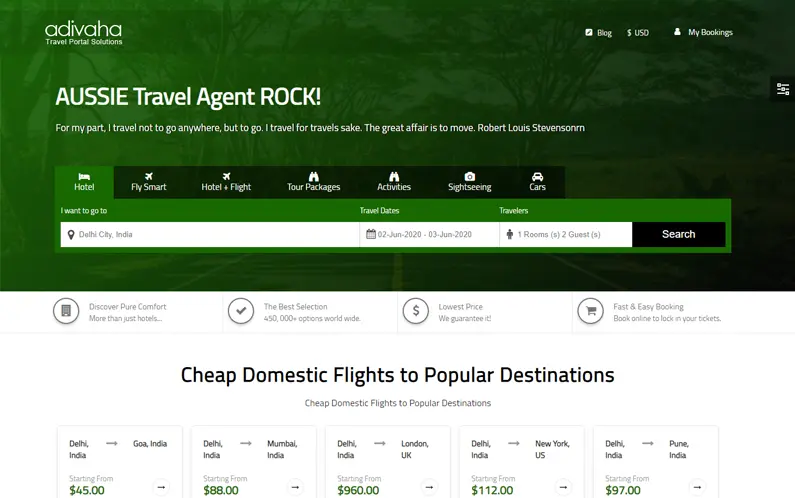Ready to go-LIVE travel solutions that helps your travel agency to sell a range of travel services pretty instantly. adivaha® travel solutions make sure you have no boundation over your imagination, you can do everything online, without the need for any technical knowledge or design skills. Easy Backoffice, extensive reporting with integrated Funds Management System. Upload funds easily and instantly through Netbanking, Debit Card, Credit Card. The best part is, we do offer customizations in case you believe it will boost your business!
Understanding and Using the Expedia API for PHP Development
Discover the power of the Expedia API for seamless PHP development. Learn how to harness its capabilities, integrate functionalities, and elevate your travel-related projects efficiently with expert guidance and practical insights.
In the realm of travel industry solutions, the Expedia API stands as a cornerstone for PHP developers seeking to enhance their offerings. This comprehensive article dives deep into the intricate workings of the Expedia API and how it can be harnessed to propel travel businesses toward success.
What functionalities does the Expedia API offer for PHP developers?
The Expedia API offers a range of functionalities for PHP developers, empowering them to create robust and comprehensive travel-related applications:
1. Vast Inventory Access:
Expedia's API grants PHP developers access to a diverse inventory encompassing hotels, flights, car rentals, activities, and more. This access enables developers to integrate a wide array of travel-related services into their applications without having to build these databases from scratch.
2. Search and Booking Capabilities:
PHP developers can implement robust search functionalities, allowing users to seamlessly explore, filter, and book various travel services directly through the API. This functionality enhances user experience by providing a convenient booking process within the application.
3. Real-time Pricing and Availability:
 Using the Expedia API for PHP Development
Using the Expedia API for PHP DevelopmentThe API offers real-time access to pricing, availability, and promotional offers for accommodations, flights, and other services. This feature empowers developers to display up-to-date information to users, fostering trust and enabling users to make informed decisions.
4. Comprehensive Content and Descriptions:
Detailed content, descriptions, images, and user reviews for hotels, flights, and activities are available through the Expedia API. Integrating this content enhances the richness of the application, providing users with comprehensive information to aid in their decision-making process.
5. Booking Management Integration:
Seamless integration with Expedia's booking management system allows PHP developers to facilitate reservations, cancellations, and modifications within their applications. This feature streamlines the booking process and enhances user convenience.
6. Geo-location Services and Mapping:
Leveraging the API, developers can integrate geo-location services, maps, and location-based recommendations into their applications. This functionality enables personalized and location-specific experiences for travelers, enriching their interaction with the application.
How can PHP developers access and navigate the Expedia API documentation effectively?
Accessing and navigating the Expedia API documentation effectively is crucial for PHP developers to leverage its functionalities. Here's a guide on how they can do this:
1. Registration and API Key Acquisition: PHP developers should begin by registering for an Expedia API developer account. Upon registration, they'll receive an API key that grants access to the documentation and API endpoints.
2. Understanding the Documentation Structure: Expedia's API documentation is typically organized into sections based on functionalities (e.g., hotels, flights, activities). Developers should familiarize themselves with this structure to locate relevant information efficiently.
3. Endpoint and Parameter Understanding: Each API endpoint has specific functionalities and parameters. Developers should study the endpoint descriptions, supported parameters, and expected responses to understand how to craft API requests effectively.
4. Sample Code and Tutorials: Expedia often provides sample code snippets and tutorials for different endpoints or use cases. Developers should explore these resources to gain practical insights into implementing API calls within PHP projects.
5. Testing and Sandbox Environment: Utilize the sandbox environment provided by Expedia to test API calls without affecting live data. This allows developers to experiment, understand responses, and debug their integration effectively.
6. Community and Support Channels: Engage with the developer community or utilize Expedia's support channels, forums, or documentation feedback mechanisms. This interaction can provide valuable insights, troubleshooting tips, and updates on best practices from experienced developers and the Expedia team.
7. Stay Updated with Documentation Revisions: Given that APIs evolve over time, staying updated with revisions or version changes in the documentation is crucial. Developers should regularly check for updates, new features, or deprecations to ensure their integration remains robust and compliant.
What steps are involved in setting up and integrating the Expedia API into PHP-based solutions?
Setting up and integrating the Expedia API into PHP-based solutions involves several essential steps:
1. Register and Obtain API Credentials:
Create a developer account on Expedia's developer platform to access the API. Obtain the necessary credentials, including an API key or authentication tokens required for making API requests.
2. Understand API Endpoints and Functionality:
Familiarize yourself with Expedia's API documentation, exploring available endpoints, their functionalities, supported parameters, and expected responses. Understand which endpoints align with your project's requirements.
3. Implement Authentication Mechanism:
Utilize the API key or authentication tokens obtained during registration to authenticate API requests. Implement the necessary authentication mechanisms, such as OAuth or API key authentication, as per Expedia's guidelines.
4. Set Up API Requests in PHP:
Use PHP's built-in functions or libraries (e.g., cURL, Guzzle) to create HTTP requests to the Expedia API endpoints. Construct API calls with appropriate HTTP methods (GET, POST, PUT, DELETE) and include required headers and parameters.
5. Handle API Responses:
Develop logic within your PHP code to handle API responses effectively. This involves parsing the response data, error handling, and implementing logic to process and display relevant information within your application.
6. Testing and Debugging:
Utilize sandbox or testing environments provided by Expedia to test your API integration thoroughly. Ensure that API requests are functioning as expected, handle errors gracefully, and troubleshoot any issues that arise during testing.
7. Optimization and Security Considerations:
Optimize API calls by minimizing unnecessary requests, implementing caching mechanisms where applicable, and adhering to best practices to improve performance. Ensure secure transmission of data by using HTTPS and handling sensitive information securely.
8. Documentation and Maintenance:
Document your integration thoroughly, including details about endpoints used, parameters, and any specific implementation considerations. Regularly maintain and update your integration as per Expedia's API updates or changes in your application's requirements.
What considerations should PHP developers keep in mind to ensure future compatibility and scalability with Expedia API updates?
PHP developers aiming for future compatibility and scalability with Expedia API updates must adopt a proactive approach. Remaining vigilant about Expedia's API versioning and changes is paramount, necessitating continuous monitoring of release notes, update logs, and deprecation notices. Designing applications with a modular and flexible architecture allows for swift adaptation to API modifications, incorporating abstraction layers or wrappers around API calls to facilitate seamless transitions. Adhering to best practices recommended by Expedia ensures compliance and reduces the risk of compatibility issues. Rigorous testing in staging environments before production deployment helps identify and rectify potential compatibility hurdles. Comprehensive documentation within the codebase, along with informative comments, serves as a roadmap for future developers, aiding understanding and adaptation. Scalability considerations in the application's architecture anticipate increased traffic or data volume resulting from updates or business growth. Continuous monitoring tools, user feedback integration, and active engagement with Expedia's developer resources complete the loop, ensuring a proactive and agile approach to API updates and changes.
In what ways can innovative solutions like Adivaha complement and enhance the functionalities of the Expedia API within PHP-based travel businesses?
Innovative solutions such as Adivaha play a pivotal role in augmenting the functionalities of the Expedia API within PHP-based travel businesses. Adivaha®’s offerings often bring a layer of specialized enhancements, complementing the Expedia API's robust features. Firstly, Adivaha may provide additional customization options, allowing businesses to tailor their offerings more precisely to their target audience. This customization might extend to unique user experiences, specialized filtering, or personalized recommendations not directly available through the Expedia API alone. Moreover, Adivaha could streamline integration processes by offering pre-built modules or plugins specifically designed for PHP-based applications, simplifying the implementation of Expedia's services and reducing development time. Additionally, Adivaha might introduce advanced analytics and reporting tools, empowering businesses to extract deeper insights from Expedia's data, and enabling smarter decision-making and strategy formulation. Overall, by complementing Expedia's API with tailored enhancements, Adivaha can significantly elevate the value proposition and competitiveness of PHP-based travel businesses in a dynamic and evolving market landscape.
Conclusion
Mastering the Expedia API for PHP development empowers travel businesses to create seamless applications with access to vast inventory, real-time pricing, and advanced booking features. Future-proofing strategies ensure adaptability to evolving updates. Innovations like Adivaha complement these capabilities, offering tailored enhancements for a competitive edge. This knowledge not only enhances PHP developers' skills but also propels businesses towards innovation and efficiency in the dynamic travel tech landscape.
Keep Refreshing your customers - Who doesn't want his site to stand out from crowd? adivaha® gives you multiple options for home pages, headers, colors etc. Which can easily be managed from admin via shortcodes and settings. The theme supports almost all the big players in this market ie, WEGO, Travelpayouts, Agoda, Booking, Expedia etc.












